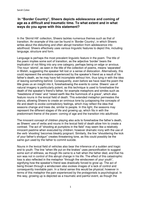Sarah Colee
In “Border Country”, Sheers depicts adolescence and coming of
age as a difficult and traumatic time. To what extent and in what
ways do you agree with this statement?
In the ‘Skirrid Hill’ collection, Sheers tackles numerous themes such as that of
transition. An example of this can be found in ‘Border Country’, in which Sheers
writes about the disturbing and often abrupt transition from adolescence into
adulthood. Sheers effectively uses various linguistic features to depict this, including
language, structure and form.
Language is perhaps the most prevalent linguistic feature in the poem. The title of
the poem implies some sort of transition, as the adjective ‘border’ bears the
implication of not fitting into any one category, perhaps being on edge or anxious.
The noun ‘skirrid’, as seen in the title of the collection of poems, means ‘separated’
in Welsh, suggesting the speaker felt lost or a sense of dislocation. Alternatively, this
could represent the emotions experienced by the speaker’s friend as a result of his
father’s death, as he may have felt incomplete without him, thus tying in with the idea
of leaving something behind. Consequently, even before we have read the poem the
title gives us an insight into it, foreshadowing the events to come. Sheers’ use of
natural imagery is particularly potent, as this technique is used to foreshadow the
death of the speaker’s friend’s father, for example metaphors and similes such as
“headstone of trees” and “raised earth like the hummock of a grave”, which also
feature nouns in the lexical field of death. This extended metaphor permeates the
stanza, allowing Sheers to create an ominous tone by juxtaposing the concepts of
life and death to evoke contradictory feelings, which may reflect the idea that
seasons change and trees die, similar to people. In this light, the seasons may
represent the different stages of life and growing up, which fits in with the
predominant theme of the poem: coming of age and the transition into adulthood.
The innocent concept of children playing also acts to foreshadow the father’s death,
as Sheers’ use of verbs and nouns in the lexical field of death allow him to create a
contrast. The act of “shooting at pumpkins in the field” may seem like a relatively
innocent pastime when executed by children; however dramatic irony with the use of
the verb ‘shooting’ becomes bleakly poignant. Similarly, the line “shouldering the kick
of your father’s shotgun” creates threatening tone, as this could possibly be the
same gun used by the father to commit suicide.
Nouns in the lexical field of vehicles also bear the inference of a sudden and tragic
end to youth. The line “when life put on the brakes” uses personification to suggest
some sort of stillness, as though life came to a halt when the father died, and that his
son was not in control of this abrupt change in his life. The effect of this catastrophic
loss is also reflected in the metaphor “through the windscreen of your youth”,
signifying how the speaker’s friend was drastically forced to grow up. The act of
being thrown through a windscreen also evokes images of a lack of control and
consequently inevitable pain. In a literal sense this would be physical; however in
terms of this metaphor the pain experienced by the protagonists is psychological. In
this way, growing up is depicted as a traumatic and painful event, as though the
1




